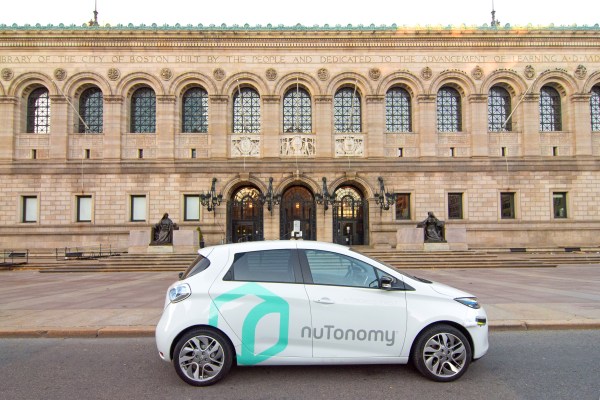Lyft has another partners in the world of autonomous vehicles, its third behind GM and Waymo if you’re keeping count. The newest partner is Nutonomy, the Boston-based autonomous vehicle technology company that made waves by being first to real roads with a self-driving taxi – thanks to a team-up with Singapore’s economic development board. Now, Nutonomy and Lyft are launching a self-driving ride hailing service closer to home – in Boston, where a pilot project will see a couple of cars begin picking up riders sometime in the coming months.
During a press call to discuss the new partnership, Lyft co-founder and CEO Logan Green noted that his company believes ride sharing will account for “over 80 percent of all miles traveled” within a couple of decades, and that the way this will happen is via autonomous vehicle tech. That’s why it’s entering into this partnership with Nutonomy, he said, which, in its first stage, will focus on the passenger experience.
Both Nutonomy and Lyft are relatively inexperienced when it comes to actually transporting passengers in self-driving vehicles, as Nutonomy CEO and co-founder Karl Iagnemma noted on the call. So, too, is basically everyone, however, since this is relatively untrodden territory.
“We don’t really know in detail how riders are going to engage with autonomous vehicles because, frankly, we just don’t have that much experience,” Iagnemma said. That’s why they’ll be looking to use this partnership to gather data on rider interaction with the service, from hailing, to meeting their vehicle, to in-car experience and more. Green noted that it’ll focus on the entire “end-to-end” rider journey, and will include a new extension of the Lyft app that appears in-car on tablets mounted within the vehicles used for the pilot.
Those cars will initially be a small number of Renault Zoe EVs, which Nutonomy began road-testing in Boston starting last November. Iagnemma confirmed that Nutonomy engineers are already working on integrating Lyft software into “a couple of” vehicles, to be deployed sometime “in the coming months,” for actual customer pickups, though no more specific timeline was given.
Green and Iagnemma noted that long-term, the companies hope to field “thousands” of Nutonomy vehicles on Lyft’s ride hailing network. Green wouldn’t comment specifically on how this partnership will or won’t impact existing work with GM and Waymo, only noting that each are completely separate agreements, each “very different” in nature.
The two are a good fit because they’re both “safety first organizations,” too, according to Green. But neither is ready yet to discuss exactly how riders from Lyft’s user pool will be selected to take part in the trial – Uber’s debut Pittsburgh service, which was open to regular riders, would alert customers that they’d be receiving an autonomous test vehicle after their trip was confirmed, and it’s likely Lyft will do something similar.
This partnership is also all about mutual benefit; no money is changing hands in either direction as a result of the deal.
“There is no financial arrangement between the two companies,” Logan confirmed. “It’s a collaborative, R&D-based partnership.”
In addition to its new collaborative effort with Lyft, Nutonomy recently announced a partnership with Peugot owner PSA for autonomous vehicle testing in Singapore. Iagnemma noted on the call that this is designed to ultimately help integrate Nutonomy’s tech in a range of PSA vehicles that can eventually be run on ride hailing platforms like Lyft’s, once they become more prevalent.
Meanwhile, Lyft has previously been reported to have plans to bring pilot self-driving taxi tests to market starting sometime next year, and earlier this year, it announced a new partnership with Waymo to work on public introduction of self-driving tech. Ultimately, there’s no reason for it to limit its partners on the autonomy software or hardware side, since it’ll likely hope to open its ride hailing network to a range of partners instead of limiting itself and its profit potential.
